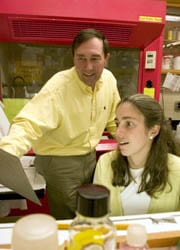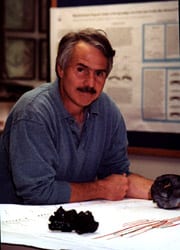Two New Directors Named for WHOI’s Ocean Institutes
May 6, 2004
An international red tide expert and a leading researcher in mid-ocean ridge volcanism and hydrothermal processes have been named directors of two Ocean Institutes at Woods Hole Oceanographic Institution (WHOI).
Biologist Donald Anderson will become director of the Coastal Ocean Institute on July 1, and Marine Geologist Daniel Fornari will become director of the Deep Ocean Exploration Institute on June 1. Laurence Madin and William Curry will continue as directors of the Ocean Life Institute and Ocean and Climate Change Institute, respectively.
WHOI established four Ocean Institutes in 2000 to encompass interdisciplinary research of significant concern to the public and policymakers. The mission of the Ocean Institutes is to provide a broad base of the most recent scientific knowledge and make it accessible to decision-makers who can use it to save lives, stimulate economic growth, and enhance the quality of life. Communication of research findings to the public is central to the missions of WHOI’s Ocean Institutes.
Both Anderson and Fornari are involved in many research programs at the Institution and in the international oceanographic community. Anderson is a Senior Scientist in the Biology Department and heads the US National Office for Marine Biotoxins and Harmful Algal Blooms, located at WHOI. Fornari is a Senior Scientist in the Geology & Geophysics Department and is the Chief Scientist for Deep Submergence. In the latter role, he provides scientific input to the development of the US National Deep Submergence Facility (NDSF) located at WHOI to help improve its vehicle systems, serves as an advocate for scientific users of the facility, and provides a voice for NDSF and deep submergence science both nationally and internationally.
“Don and Dan are scientists of great accomplishment, and are well-respected in the research community,” said WHOI Executive Vice President and Director of Research James Luyten. “They have tremendous energy and commitment to advancing their respective fields and ocean sciences as a whole. Their diverse backgrounds and expertise in communication will serve them well as Institute Directors.”
Anderson succeeds Kenneth Brink as Director of the Coastal Ocean Institute. Brink has been named chief scientist for the national Ocean Research Interactive Observing Networks (ORION) program office in Washington and will split his time between Woods Hole and Washington D.C. Fornari succeeds Susan Humphris as Director of the Deep Ocean Exploration Institute. Humphris will assume duties as Chair of the Institution’s Geology and Geophysics Department.
Anderson has conducted research for 25 years on red tides, in which microorganisms accumulate in the ocean at concentrations that can discolor water. Many red tide organisms produce potent toxins that can kill fish or make shellfish and other seafood products dangerous to eat. A growing problem throughout the world, some theorize the increases result from human exploitation and pollution of the coastal zone. Anderson has traveled to many countries to assist with red tide monitoring and research programs, and collaborates with researchers worldwide. He also operates a research laboratory focusing on red tide ecology, physiology, genetics, and toxicology.
Anderson has been affiliated with Woods Hole Oceanographic Institution since 1978, when he was a postdoctoral investigator. He was appointed assistant scientist in 1979, associate scientist in 1983, and was awarded tenure in 1983. He was appointed senior scientist in 1991, and held the Stanley W. Watson Chair for Excellence in Oceanography from 1993 to 1998. In 1999, he received the NOAA Environmental Hero award. He holds bachelor’s, master’s, and Ph.D. degrees from the Massachusetts Institute of Technology in mechanical and civil engineering, with a specialty in aquatic science.
Fornari is internationally recognized for his research on volcanic and hydrothermal processes and mapping at mid-ocean ridges, and on the structure and magmatic processes at oceanic transforms and oceanic islands, such as Hawaii and the Galapagos. In his nearly 35 years of seagoing experience, he has participated in 55 research cruises in the Pacific, Atlantic and Indian Oceans, and has completed over 100 dives in Alvin and other Navy submersibles. Together, he and Susan Humphris developed the Dive and Discover Web site in 2000, an internationally recognized education and outreach Web site that brings the excitement of oceanographic science to thousands of students each day. He is the author or co-author of more than 85 scientific papers, and has served on numerous scientific panels, and national and international committees, including the President’s Panel on Ocean Exploration.
Fornari has been affiliated with WHOI since 1993, when he joined the geology and Geophysics Department as associate scientist with tenure and became the first Chief Scientist for Deep Submergence, a position he held for 11 years. He is currently a senior scientist and holds the W. Van Alan Clark Sr. Chair. Fornari received a B.S. degree in geology from the University of Wisconsin-Madison, two master’s degrees in geology and marine geology, and a Ph.D. degree in marine geology from Columbia University.
Woods Hole Oceanographic Institution is a private, independent marine research and engineering, and higher education organization located in Falmouth, MA. Its primary mission is to understand the oceans and their interaction with the Earth as a whole, and to communicate a basic understanding of the ocean’s role in the changing global environment. Established in 1930 on a recommendation from the National Academy of Sciences, the Institution is organized into five departments, interdisciplinary institutes and a marine policy center, and conducts a joint graduate education program with the Massachusetts Institute of Technology.


